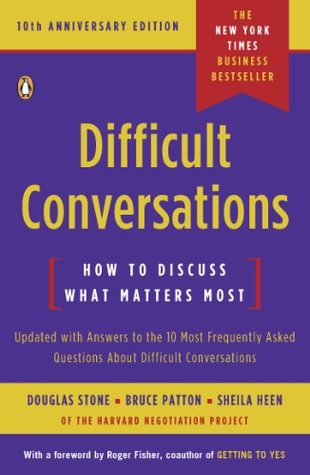More on this book
Community
Kindle Notes & Highlights
At heart, the problem isn’t in your actions, it’s in your thinking. So long as you focus only on what to do differently in difficult conversations, you will fail to break new ground.
it will help you understand better what you’re up against and why it makes sense to shift from a “message delivery stance” to a “learning stance.”
1. The “What Happened?” Conversation. Most difficult conversations involve disagreement about what has happened or what should happen. Who said what and who did what? Who’s right, who meant what, and who’s to blame?
2. The Feelings Conversation. Every difficult conversation also asks and answers questions about feelings. Are my feelings valid? Appropriate? Should I acknowledge or deny them, put them on the table or check them at the door? What do I do about the other person’s feelings?
The point is this: difficult conversations are almost never about getting the facts right. They are about conflicting perceptions, interpretations, and values.
Interpretations and judgments are important to explore. In contrast, the quest to determine who is right and who is wrong is a dead end.
What I think about your intentions will affect how I think about you and, ultimately, how our conversation goes. The error we make in the realm of intentions is simple but profound : we assume we know the intentions of others when we don’t. Worse still, when we are unsure about someone’s intentions, we too often decide they are bad.
But talking about fault is similar to talking about truth — it produces disagreement, denial, and little learning. It evokes fears of punishment and insists on an either/or answer. Nobody wants to be blamed, especially unfairly, so our energy goes into defending ourselves.
When competent, sensible people do something stupid, the smartest move is to try to figure out, first, what kept them from seeing it coming and, second, how to prevent the problem from happening again. Talking about blame distracts us from exploring why things went wrong and how we might correct them going forward. Focusing instead on understanding the contribution system allows us to learn about the real causes of the problem, and to work on correcting them.
difficult conversations do not just involve feelings, they are at their very core about feelings.


